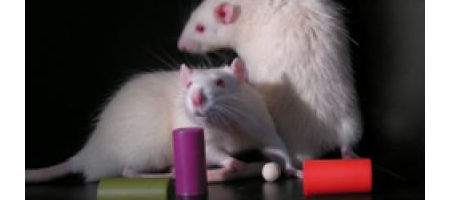Um… what? Sorry. Now I know there was something I was going to tell you… Got it.

A new study of those things like mice only bigger has found that if you deprive them of sleep (aah, sleep), parts of their brains take a nap anyway.
Even though they appear awake and active, brainwave measures show that scattered groups of neurons in the cortex are nodding off on their own, scientists funded by the National Institutes of Health have discovered.
“Such tired neurons in an awake brain may be responsible for the attention lapses, poor judgment, mistake-proneness and irritability that we experience when we haven’t had enough sleep, yet don’t feel particularly sleepy,” explains Giulio Tononi of the University of Wisconsin-Madison, tripping over the rug and crashing into his desk.
“Strikingly, in the sleep-deprived brain, subsets of neurons go offline in one cortex area but not in another – or even in one part of an area and not in another.”
Tononi and his team tracked electrical activity at several sites in the cortex as they kept rats awake for several hours. Rather than putting on a gripping movie or laying on a party next door, they gave them balls, boxes, tubes and smelly nesting material from other rats.
They found that the sleepier the rats got, the more groups of cortex neurons switched off, seemingly randomly, in various different spots. These tired neurons’ electrical profiles looked like those during NREM or slow wave sleep.
But the rats’ overall EEG, and their behavior, showed they were awake – indicating that neuronal tiredness differs from microsleep, where people show three to 15 second periods of true sleep. It’s more like the local lapses seen in some forms of epilepsy, suggest the researchers.
But, says the team – and I hope the boss isn’t reading this – the tired neurons did interfere with task performance. If neurons switched off in the motor cortex immediately before a rat tried to reach for a sugar pellet, it cut its chances of success by over a third. And the longer a rat was awake, the more it missed.
Time for a coffee, I think.






